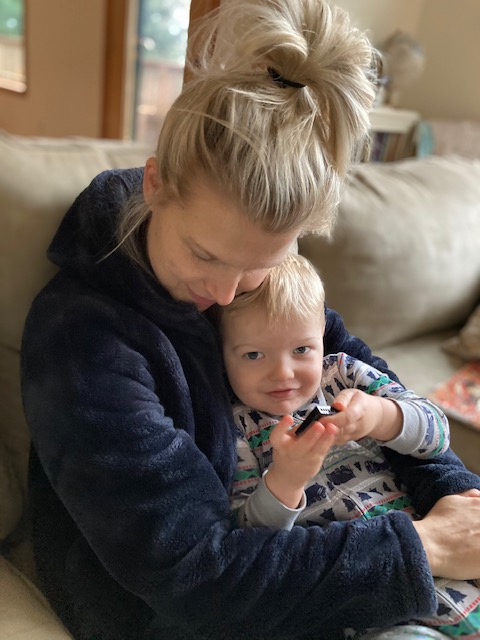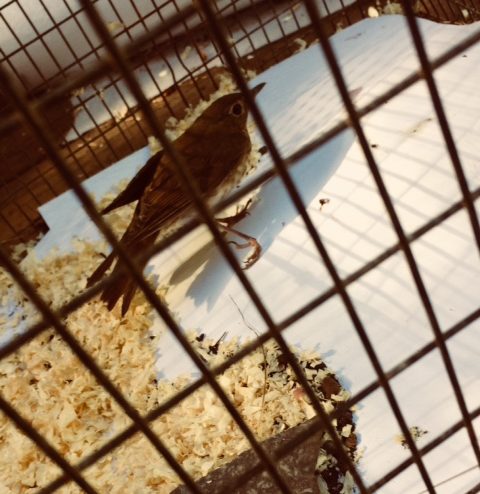When we strike the rock: leading and parenting from anger
Every time I read about Moses I learn more about leadership. In my most discouraging moments, at times when I’ve wanted to quit or I’ve felt hopelessly unqualified for the task at hand, God has used Moses to correct, encourage, inform, and equip me for whatever was ahead.
Moses was awesome, but also failed. The people he led wavered between loving him and hating him. There were high highs and low lows. There were many crises. He wanted to quit on multiple occasions.
Sounds like leadership. Also sounds like parenting.

Anybody? Parenting is really just an intense 24-7 form of leadership. I have told Jeff multiple times, when bemoaning some seemingly terrible leadership decision from someone in power, “If only we had more MOMS in charge! Anyone who has trained a toddler knows that [this plan] is not going to work!”
This time around studying Moses, a new truth surfaced from the never-changing-but-always-fresh words of Scripture.
The tragic striking of the rock.
As some of you know, early on in the wilderness journey, God tells Moses to strike the rock (Ex. 17:6) in order to provide water for the people to drink. Moses was already desperate at that point as the people were ready to kill him they were so thirsty. The people were quarreling, complaining, grumbling — this is NOT a happy scene. But Moses obeys God, strikes the rock, and they had water to drink.
Much later on, in Numbers 20, Moses is getting worn down. He’s endured the Golden Calf incident, he’s endured the endless complaining of the people to such an extent that he cries out to God,
“I am not able to carry all this people alone; the burden is too heavy for me. If you will treat me like this, kill me at once.”
Numbers 11:14
In the margin of my Bible my handwriting reads, from years before, “Leadership: I’d rather die than do this. So hard.” That’s what Moses felt like! After this, even his own brother and sister, the very closest people to him, even THEY oppose him. And then the spies that check out the promised land are cowardly and they fill the people with fear, then the people rebel again, Israel is defeated in battle, Korah’s rebellion ensues and 250 chiefs of the people rise up against Moses and the ground opens up and swallows them and their families whole.
This is unbelievable opposition, difficulty, resistance, push-back.
This sounds like training a strong-willed toddler!
Anybody? Anytime I think that leadership or parenting is difficult, I can just lay it all out next to Moses situation here and it gives me perspective.
So this sets the stage, sadly, for Moses’ failure. He’s endured incredible opposition, complaining, animosity, even rebellion and betrayal. I’m guessing that at this point he’s HAD IT UP TO HERE with these people.
And so, in one incredibly sad, tragic moment, he allows all the pent-up frustration to get to him, and he makes his fatal mistake:
He lets himself lead out of anger.
The people are thirsty. AGAIN. The people complain. AGAIN. The people assemble themselves against Moses. AGAIN.
So God tells Moses to “tell the rock before their eyes to yield its water.” Got that? He doesn’t tell him to strike the rock this time, but only tell the rock. But what does Moses do?
Again, he’s sick to death of all this complaining. So he says,
“‘Hear now, you rebels; shall we bring water for you out of this rock?” And Moses lifted up his hand and struck the rock with his staff twice.’
(Num 11:10)
Then what happened. Water came out of the rock. The people drank. Perhaps on the outside it seemed fine.
But it wasn’t fine. Moses had disobeyed. He had let the people’s complaining drive him to the point that he responded out of anger and misrepresented God.
Apparently, that is a MONUMENTAL no-no. Because of it, Moses didn’t get to enter the promised land.
I’ve often reflected on the fact that God’s punishment of Moses seems harsh. He did so many things right. And yet, this one mis-step cost him dearly. He would never get to set foot into the promised land and see that fulfillment of all God promised to do.
As parents, we’ve probably all had those moments where we let our children’s misbehavior drive us to the point where we respond out of anger. Hands down, this is my biggest regret of my early parenting years.
(Please note, it wasn’t necessarily that striking the rock was bad. I have heard people say that they refuse to do this or that form of discipline because they associate that form with anger. To be sure, we absolutely SHOULD NOT discipline out of anger, but we have to be careful that we do not assume that one form of discipline is necessarily out of anger and others are not. It’s our hearts. One time, God told Moses to strike the rock. The next time, He told him to do something different. Therefore, it wasn’t necessarily the method that mattered, it was his heart, his obedience to God, and it was that Moses was to represent God accurately.)
But what struck me this time (pun totally intended), was that it was Moses’ responsibility not to let the people’s complaining drive him to a place that He disobeyed God and responded out of anger. Sure, the people complained, but God held MOSES responsible for his own actions. The people died for their own sin. God took care of them. But Moses had no excuse.
Parents, leaders: WE are responsible for our own souls. We are responsible for whether or not we let the push-back or complaining or whatever challenges lead us to a place of anger and disobedience to God.
For me personally, this was a sobering word from God. God is going to do what He will with or without me. He is going to be faithful. He is going to be gracious. He is going to carry out His good will in this world.
Do I want to be part of it or not? Do I want to see the fulfillment or not?
No one else is responsible for my responses. No one else is responsible for making sure that Kari doesn’t lose her temper (or or her mind!). I cannot expect other people to not “push my buttons.”
I don’t get to blame anybody else for my lack of grace.
I know we can’t know things like this, but it does make me wonder, “What if Moses had done a better job shepherding his own soul? What it Moses had taken more time to be alone with God and allow God to heal and encourage and strengthen him?” Of course we can’t know that. But I CAN learn from his life and recognize that I need to build in pressure-valves into my life so that I can get with God and allow Him to take that pressure away, so that I don’t blow up and misrepresent God to my children or to those I lead.
For me, this is a serious word that requires careful consideration of what practical steps need to be taken. If you have ever found yourself responding to your children, or family, or co-workers, or those you lead, out of anger — perhaps this word is for you as well?
God will do His thing with or without us. I don’t want to miss it. I want to see the Promised Land.
My thoughts on Covid + 5 ways to cultivate the health of my heart
“I will just be happy to talk about something other than Covid!”
Ha. That was my friend’s text responding about our upcoming book-discussion group. Oh man, seriously. Hands down, this has been the hardest ministry season of our lives. A couple days ago in my morning Bible reading I read an interesting Proverb:
“A man’s spirit will endure sickness, but a crushed spirit who can bear?”
(Prov. 18:14)
That pretty much sums it up. In the last six months, I haven’t had a single person in my life who has been crushed due to physical illness. I actually don’t know anyone who’s been sick beyond a mild cough or cold. And yet, an overwhelming number of people have and are battling crushed spirits.
 Please understand this isn’t a political statement. I’m not saying that wearing a mask is crushing someone’s spirit. I’m happy to wear a mask. In fact, yesterday I forgot my mask at Papa Murphy’s so I wore a diaper on my face. We need some humor, people! We’re dying from a lack of laughter!
Please understand this isn’t a political statement. I’m not saying that wearing a mask is crushing someone’s spirit. I’m happy to wear a mask. In fact, yesterday I forgot my mask at Papa Murphy’s so I wore a diaper on my face. We need some humor, people! We’re dying from a lack of laughter!
“A joyful heart is good medicine but a crushed spirit dries up the bones!”
(Prov. 17:22)
I’m also not saying the physical symptoms of Covid aren’t a real concern. I know they are. I am saying that the atmosphere right now seems toxic to our souls and that’s what concerns me most. That’s what has made me cry myself to sleep and sometimes want to move out to the woods (Wait, we live in the woods–well, farther out into the woods) and avoid all contact with people for the foreseeable future.
I was telling a friend the other night, everything feels happy-sad right now:
Read MoreIt is good for me
Was visiting with a dear friend yesterday and we were reflecting on God’s loving discipline in our lives and how we’re THANKFUL for it. It’s evidence that He loves us! Reminded me of this from 2 years ago…
Recently, as I drove home from a speaking event, I was worshiping in the car, singing at the top of my lungs, and so clearly in my mind’s eye I saw a picture:
It was of Jeff and me. We were standing side-by-side, holding hands, looking ahead, faces resolved. We were covered in soot, ash. Our hair was singed. And I heard:
You made it through the fire.
Tears welled up. A release of relief, emotions washed over me.
This year has felt like a fire in so many ways. In ways I’ve shared, in ways I haven’t, it has felt like a fire.
And although I know more challenges will inevitably come, there is a peace and joy and relief in sensing that at least this particular season has come to a close.
Later that weekend, Jeff and I sat on the couch, reflecting on this year. I told him how I kept returning to Psalm 119, the psalmist words echoed my own:
“Before I was afflicted I went astray, but now I keep your word.
You are good and do good; teach me your statutes…
It is good for me that I was afflicted, that I might learn your statutes. “
It is good for me.
I thought of the other psalm I always cling to, hold to, trust:
The Lord God is a sun and shield, the LORD bestows favor and honor. No good thing does He withhold from those who walk uprightly. (Ps. 84:11)
No good thing does He withhold … even trials.
And no, I’m not saying miscarriage is good. Not saying death is good. It isn’t. God’s good plan is always LIFE. We never have to wonder what His will is in this, it’s crystal clear in His Word.
But in this warped and fallen world, where tragedies happen and sorrow’s a steady companion, God will WORK FOR OUR GOOD, every bad thing.
He lets the devil do his worst, then flips it all upside down and uses it ALL FOR GOOD.
Our God can win with any hand.
And I can see this so clearly this year. There were things God had to allow in my life, in order to uproot, to prune, to break. Sometimes we have to be broken — really broken — in order for him to break in to those deep places and bring healing, wholeness, freedom.
Broken hearts bring breakthrough.
See, Psalm 119 highlights an important truth we don’t talk about that much: discipline.
Sadly, we tend to think of discipline only as a sort of spiritual spanking. We go through something hard and we’re like, “What did I do WRONG? Why are you punishing me?”
But discipline isn’t necessarily punishment. Discipline is training. Discipline is proactive, intentional shaping of character, sometimes through difficulty and trial, for the purpose of Christlikeness.
And, it’s important to note: discipline is done for children out of love because the parent cares enough to put in the effort to train them. Permissive parenting isn’t love, it’s a lack of love. Ignoring our kids’ misbehavior isn’t estimable, it’s deplorable. They deserve discipline because they deserve the very best we can give them. They deserve our loving, calm, gracious, and consistent discipline so they can thrive as self-controlled, kind, generous, hard-working adults. (Lord, help us!)
God loves us so much He’ll go to great lengths to make us more like Jesus. He says this in His Word.
But notice what parts are present tense and which are past:
It is good that I was afflicted.
The Psalmist is writing this after the fact. At the time it didn’t seem good. But now it’s good. Now that the broken bone has been set and healed stronger than ever. Now that the season has changed and those pruned limbs have born beautiful fruit. Now that I can see in the rearview mirror His faithfulness through it all.
So what do we do in the middle of it all?
Worship. Wait. Wonder. Wrestle. To name just a few.
We wrestle with the questions and the sea of emotions. We wonder why on earth God would let this happen. We wait on Him, trusting that somehow He will take us through. And we worship Him in the midst, knowing that He is good, right, and perfect.
You are good and do good.
From 2017 but so applicable today too. THIS is what brings authentic thanksgiving from our lives. It goes beyond counting our temporal blessings (which are abundant!) to thanking God for His steady pursuit of us, even when it means pain, because it means He is unrelenting in seeking our good.
{Happy Thanksgiving. Thank you for reading.}
The mindset that will make or break our mood
Is it just me, or do you find it strange how we can walk through the most difficult trial with joy, but then some trivial situation can completely throw us for a loop?
As I’ve shared, this fall we walked through another miscarriage, and an extremely busy season. It was emotionally and physically exhausting, but I experienced SO MUCH JOY. Even when experiencing the emotions of grief, I still had this constant sense of joy.
Then, we finished this 2-month sprint, and found ourselves so excited to fly away to sunny Arizona and enjoy a week of relaxation and play together as a family.
Our flight went well, Justice was a champ, and we were so grateful for the kindness of a dear friend who took us to the airport (at 4am!) AND generously contributed to our trip. All went well as we caught an Uber ride to our rental house (we decided not to rent a car since we can just walk everywhere in sunny Arizona). Then, as soon as we walked into the rental house, I went to change and as I made the slightest bend forward, I threw my neck and back completely out.
Within seconds of arriving, I was flat on the couch and could not move.
I won’t bore you with all the details, but suffice it to say that day included eventually walking (!) to a chiropractor, and then, while there, the mother of all monsoon rain storms struck (the chiropractor took pity on me and drove me home!), and it rained for three days straight. So much for our idea of lounging by the pool!
We still had much to be grateful for, but after a few days my joy was wearing very thin. It’s crazy how much constant pain just wears you down. I felt cold all the time, my back hurt so bad, and as the days went by this mama was beginning to get grumpy. I sent a text to a friend saying please pray for my attitude, and we decided to go for a walk during a break in the rain.
I don’t know about you, but sometimes when I’m in the middle of a funk I’m like, “Ok, Lord, but HOW do I rejoice? I know the answer is rejoice. But how?”
Usually, I think the answer involves thanksgiving, and that is very true, but as I silently prayed and walked, another subtle mindset surfaced.
You’ve shifted your mindset from being a servant to being served.
Yes. Oh my, that was exactly it. During those busy months, even though there were hard things happening, my constant mindset was that my purpose was to serve others. I was concerned with serving my children, serving the women at the events, serving others at the theater events.
Serving others was the underlying, unspoken purpose that motivated my actions.
No wonder there was joy.
But how quickly that mindset slips when we’re “on vacation”! How quickly that mindset slips when I’M tired. I’M in pain. I’M cold. Each of those things, while valid, pull our gaze inward, constantly inward. And slowly my purpose begins to slip — off of being a servant and onto expecting to be served.
And just like that, joy’s gone.
The moment I begin to see life through Self, my joy flees. I quickly grow resentful of my husband and kids. It seems that even the baby is out to demand too much of me!
What amazed me, once again, was how quickly we can slip back on that good, healthy, servant mindset, and how quickly that joy can return! On our walk, in an instant, I could mentally shift my perspective and remind myself that my call to be a servant isn’t something I can ever take a vacation from!
Jesus doesn’t call us to lay down our lives and serve others “except when you’re on vacation, then you can indulge your flesh and put yourself first.” No way! Jesus knows that the only way to find life is to lose it! It doesn’t matter if I’m on vacation or in the middle of the most demanding busy season, SERVING OTHERS IS ALWAYS THE PATH TO LIFE.
Why? Because serving others IS serving Jesus.
And serving Jesus is where life is found. Always.
This week, let’s enJOY thanksgiving by genuinely serving those around us. Let’s take joy in blessing, giving, serving those around us. I know it’s easier said than done sometimes, but let’s give it all we got! Bless you, friends. Thanks for reading.
4 ways to be free from self-pity
She came up after the prayer meeting several months ago and said quietly, “It’s self-pity.”
Ah. Yes. I hadn’t thought of that term in ages, but that was it. We had been praying over a situation, and sort of at a loss for what to pray against. Something was unclear. And that was it. A subtle sin we rarely recognize, self-pity masquerades in other acceptable forms, making it difficult to rid ourselves of its poisonous influence in our lives.
After she brought it up, it was uncanny how often it came up. I could see it so clearly, hidden beneath a thin veil of discouragement, or righteous indignation, or social withdrawal. In my very next conversation with a friend, she confessed that she struggled with … self-pity. The next conversation meandered eventually to … self-pity. It was everywhere, and most of all in me.
After identifying it, I immediately pulled a book off the shelf I hadn’t read in almost 13 years. But I still remember the quote, so vividly, by John Piper:
Consider the relationship between boasting and self-pity. Both are manifestations of pride. Boasting is the response of pride to success. Self-pity is the response of pride to suffering. Boasting says, “I deserve admiration because I have achieved so much.” Self-pity says, “I deserve admiration because I have sacrificed so much.” Boasting is the voice of price in the heart of the strong. Self-pity is the voice of pride in the heart of the weak. Boasting sounds self-sufficient. Self-pity sounds self-sacrificing.
The reason self-pity does not look like pride is that it appears to be needy.
But the need arises from a wounded ego and the desire of the self-pitying is not really for others to see them as helpless, but heroes. The need self-pity feels does not come from a self of unworthiness, but from a sense of unrecognized worthiness. It is the response of un-applauded pride.
Battling Unbelief, p. 51
Ouch. I wish I could make this less convicting, but I can’t. It’s so true. As I reflected on these words for the following months, I began to see my own subtle self-pity-parties happening with alarming frequency. Often hard to see from the outside, it often takes the form of quiet sighs, negative self-talk, mentally nursing perceived injustices, refusing to make our wishes known because “it doesn’t matter what I want.”
It’s poison for your mind and heart, and especially dangerous for moms. In fact, I think self-pity it might be the occupational hazard of motherhood. And honestly, we can’t afford to take it lightly. Jon Bloom writes,
Self-pity is a dangerous, deceitful, heart-hardening sin (Hebrews 3:13). It’s a spiritual deadener, choking faith, draining hope, killing joy, smothering love, fueling anger, and robbing any desire to serve others. And it is a feeder-sin, encouraging us to comfort our poor selves with all manner of sinful indulgence like gossip, slander, gluttony, substance abuse, pornography, and binge entertainment, just to name a few. Self-pity poisons our relationships and is often an underlying cause of our “burnout.”
DesiringGod.org.
Mamas … I say this with all love: Maybe we don’t need more self-care. Maybe we need to fight for freedom from the prison of self-pity.
How? Of course there’s no magic. But I’ve found this to help:
- Name it and ditch it. In my book (link) we talk about the importance of calling it what it is so that we can be free of it. As long as we say, “I’m just struggling with the hardships and injustices done to me,” we won’t be free. If we call it what it is–my wounded pride–we can be FREE. We can confess our sins, He is faithful and just to forgive us our sin and cleanse us of all unrighteousness.
- Declare war on it. Resolve immediately, unhesitatingly, and without remorse to absolutely destroy any trace of self-pity you identify in yourself, daily. Ask a trusted friend to help you identify subtle ways it might play out. Think through your day and determine when you are most likely to slip into these patterns. Be on guard and show no mercy.
- Give thanks. You cannot be grateful and sulking at the same time. A consistent habit of giving thanks, daily, will do wonders for working the self-pity out of our hearts. It’ll kill those self-pity weeds before they even crop up.
- Focus outward. Knowing that self-pity is a pride-related sin is enormously helpful, because then we can rest assured that a pursuit of humility will deal it a death-blow. How do we pursue humility? By pursuing the interest of others (Phil 2). When we get busy finding joy outside ourselves, there just isn’t time to nurse internal wounds.
How about you? How do you overcome the subtle sin of self-pity? I’d love to hear the insights God’s given you. Thanks for reading.
How Christmas handles our hate
Burn in hell.
I could scarcely believe the rage that surged up and crashed like a stormy wave over my heart. I couldn’t believe those words actually whispered in my mind, seething words I have never spoken, never even thought before, but there they were, in an instant. I put my phone down and pulled Justice into my arms and fled to the closet where he sleeps. There, wrapped in darkness, I could let the flood loose of angry tears. I held him close, bouncing him to sleep, Justice in my arms while I cried out aloud to God,
Where is JUSTICE in all this? How is this okay? How can you let this happen?
From somewhere, all the dozens of similar stories filled my mind. Women hurt by men.
Just last night Jeff and I had sat up late talking about his sermon series. It has been my favorite one he’s ever done—the Mothers of Jesus. Each week he’s been preaching on one of the 5 women in Jesus’ lineage. Tamar. Rahab. Ruth. Bathsheba. Mary. He’s done a phenomenal job. He is truly a man who passionately pursues the good of women, who takes seriously his role of protector and provider. And not just in theory, I have seen him act heroically, in practical ways, on behalf of the vulnerable. It’s one of the things I love about him most.
So when I asked him, last night, “What’d you think about today?” He responded,
“Bathsheba.”
We both sighed. Long silence. Yes. Bathsheba. Another story of so much incredible heartache. The victim of power’s lust, she not only lost her husband, through manipulated murder, but she lost her precious child because of a sin not her own. Yes, she got to be in the lineage of the Messiah, but in her own lifetime she knew bitter sorrow.
But you know…I’ve never actually gotten angry reading those stories in the Bible. I’ve been mildly bothered, but not upset. I’m not, in general, an angry person. I don’t hate anyone. As a whole, I just generally like people. I’ve never been wronged in a way that’s made me enraged.
But what about when someone we love, fiercely love, is hurt? What about when you have to sit back and watch some of your most loved people in the world be treated cruelly?
What if Bathsheba was your best friend and you had snuggled that sweet child in your own arms before he died?
The truth is: It’s one thing to forgive something done to us, but when those we love are wronged, that mama bear protective tendency comes roaring out of nowhere and wants to literally devour the wrongdoer.
What do we DO with that?
The answer, I think, is Christmas. It’s remembering what God DID with that and DOES with that and WILL DO with that.
I love all the coziness of Christmas, but really—Jesus is Justice. Jesus is the birth of God’s justice, the “answer” if you will to all the profound wrongs of this world, the gift to every Bathsheba and every David. The gift to every victim and every perpetrator. We all need a Savior, and it isn’t that we’re all just one vague mess of sin. We each of us sins specifically, and it’s not all the same as if individual wrongs don’t matter. They do. And that’s just it.
Anger, burning hot boiling anger, is the right response to sin.
But not just to his. Or hers.
To mine.
In that dark closet, with tears streaming down my face, God showed me how my sin equally contributes to the heartache of this world. My own pride and selfishness are just seed form of the same gnarly vicious weed rearing its ugly head out in the world.
How can I plead for mercy and demand justice all in the same breath?
But I do. And miraculously, that’s what He gives.
Jesus is the Justice and Mercy of God, born as a vulnerable babe, to bear the ultimate injustice and give the ultimate mercy.
He, in His life and death, satisfies the justice of God and extends the mercy of God.
That’s what He did at Christmas.
And what He does, daily, in our lives, by redeeming what seems unredeemable. Rescuing the hopelessly lost. Resurrecting the long-dead.
And what He will do, in perfect fullness. Every wrong righted. Every tear wiped away. We will likely be appalled at how hopelessly skewed our perspective had been. This will most certainly not be the time where we demand God give account of his dealings during our life. I dare say there will be none of that. Scales will fall from our eyes and we’ll be mind-blown that God even let us LIVE.
And our hate will seem absurd, in light of all this. If only we could glimpse into His glory, how right and perfect and just and gracious and holy and beautiful is the Kingdom of God, we could freely forgive the greatest griefs and live above the fray.
That is, live something like this:
But I say to you who hear, Love your enemies, do good to those who hate you,bless those who curse you, pray for those who abuse you. To one who strikes you on the cheek, offer the other also, and from one who takes away your cloak do not withhold your tuniceither. Give to everyone who begs from you, and from one who takes away your goods do not demand them back. And as you wish that others would do to you, do so to them.
If you love those who love you, what benefit is that to you? For even sinners love those who love them. And if you do good to those who do good to you, what benefit is that to you? For even sinners do the same. And if you lend to those from whom you expect to receive, what credit is that to you? Even sinners lend to sinners, to get back the same amount. But love your enemies, and do good, and lend, expecting nothing in return, and your reward will be great, and you will be sons of the Most High, for he is kind to the ungrateful and the evil. Be merciful, even as your Father is merciful.
We need Christmas more than ever before. Joy to the world, the Lord is come. Let earth receive her King.
To you, that one weary from caring
“Mommy, that bird!”
Heidi ran down the stairs to the center of the driveway, bent over the broken feathered friend.
Truth be told, I had already seen the bird. But I was eager to finish my walk, I was weary from so much brokenness already, and my compassion-well was bone dry. Besides, it was a bird.
I walked a little closer and it was clear what had happened — just a few feet away our housemates’ cat crouched, ready to finish the job. Heidi placed herself between the bird and the predator.
“His wing is broken, we have to help!”
Compelled by compassion, she swooped in, urging the bird into a bucket, something to keep him safe. But of course, we all know what happened:
Whenever you move toward the wounded they flail, flee, fearful of the very one who offers safety.
Blind to the greater danger just out of sight.
The cat came nearer, creeping ever closer … Heidi turned toward it, ready to defend the weak:
“No, go away!”
With greater intensity she prodded the flailing bird into the container, trying to be gentle but also recognizing the danger of leaving this little creature alone.
Time was of the essence.
Even as I leaned in to help, I saw the bird resisting her nudges, moving against her. I could only imagine if that bird could articulate how he felt:
Ouch! Don’t poke me! You’re doing it wrong! Stop! I hate you. You’re the problem! Leave me alone!
I blinked back tears.
The cat kept close. Ever ready to pounce. The bird, unaware, kept fighting.
Once the bird was out of immediate peril, Dutch and Heidi quickly created a nest, a safe place, in a cage we had on hand.

The cage, those parameters, weren’t meant to confine or control, they had to keep that broken bird safe.
Oh, little bird, you aren’t in trouble, you’re in danger.
Ever eager to help, they quickly researched eating habits, how to best help this thrush.
Consumed with compassion, they gave all their effort to helping it heal.
Heidi happily dug up worms. Every few hours, she’d return to the cage, feed her feathered friend.
His well-being was never far from her mind.
I watched. Wishing with everything in me that this might turn out well.
The next day, the thrush died.
Thankfully, Heidi took it well. Better than me in my own broken-bird situations.
Hadn’t I just sat, tears blurring my vision, pouring out heartache over all the wounded ones? A complicated mixture of frustration, hurt, grief, ache, sorrow. Tinges of hopelessness mingled in, a little bit of wanting to give up.
Why help the broken, when all you get is a broken heart?
After drying my tears, I walked downstairs, saw Heidi sitting there caring for her own kitten. Her compassion still flowing freely, untainted by the previous day’s loss. Sure, the thrush had died, but were her efforts wasted?
Of course not. She’d done right. Done well. I was so proud. And, her heart grew in the process.
Every time we love, truly love, we grow. Our capacity widens, deepens, heightens, reaches farther into the dark crevices and undoes the Evil One’s work.
Be sober-minded; be watchful. Your adversary the devil prowls around like a roaring lion, seeking someone to devour. (1 Peter 5:8)
Remember this: Whoever turns a sinner from the error of their way will save them from death and cover over a multitude of sins. (James 5:20)
And I thought of you. You who are weary of helping and being blamed in the process. You who are tired but get back up and try again. You who are quietly bearing burdens. You, silent wife, who are trying to honor your husband but your eyes cry out pain louder than any words can say. You, faithful mama, who agonize over what’s best for your kids, and wonder how to heal their hearts. You, aging parent, who watch young ones from a distance and wish you could swoop in and save. You, bereaved one, who move outside your own pain in order to selflessly serve others. You, friend battling disease, who aren’t defined by your diagnosis but who chooses to fight every day. You, faithful non-profit worker, who quietly works behind the scenes so others can thrive.
You, who care. You who pick up the broken-winged birds. Who dig up worms and visit cages.
You who carry the wounded on your heart all day long.
There’s a whole army of you out there, I know. And you are seen. The God Who Sees (Gen. 16:13) has seen and He is never aloof. He never gets compassion-fatigue. He never runs out of grace and peace and mercy and patience and if you will slow down and sink into His presence, He will fill you afresh.
You get to be part of the Fellowship of the Brokenhearted.
This isn’t to make a hero of you, of me, it’s just to say: Don’t give up. Draw again from His well, His unlimited supply, His eternal resources extended to us if we ask. Don’t attempt all this in your own strength. Roll ever burden, all over again, onto Him. And if you are hated in the process, remember, He was too.
There’s nothing you will face that He hasn’t already.
Don’t let the darkness win. Light always overcomes. Keep wielding the light, dear friend.
Oh, and take a nap too. That’ll help.
{Thanks for reading.}
When your heart is overwhelmed…
The text popped up and my heart sank. Again. What is wrong with this crazy world?! It just seemed that everywhere I looked, things were not as they should be. Why are so many things so very wrong? Why do people make such terrible decisions? Why are children’s heart’s broken?
That morning Jeff preached on our response to trials and injustice, and he specified:
“I’m not talking about the injustices you tweet about, I mean the ones you lose sleep about. The ones that keep you up at night and break your heart. Those injustices.”
Usually those are the ones close to home. The ones that touch your own heart, the ones in your own path.
Like the Good Samaritan, these are the tragedies and injustices lying in the road right in front of us.
These are our neighbors.
And then, he exhorted us, “If there are never injustices that keep you up at night, you probably should get more involved in people’s lives.”
That struck me. Yes. The heartache we feel when we enter the nitty-gritty of life with people, is appropriate. Jesus’ heart broke as he walked with wayward and weary and sick and sinning individuals. He was the Son of God. He knew the end of the story. And yet He wept over Lazarus. Over Jerusalem.
And yet, He was never overwhelmed. He never lost hope or slipped into cynicism or threw up his hands. How?
Among many other things, I believe He spread it all out before the LORD.
Just the day before I had read Isaiah 37, and found so much comfort in the familiar story of Sennacherib and his threats against King Hezekiah and the people of God. As you may recall, Sennacherib is hurling threats, and recounting all the kings he’s already conquered, mocking King Hezekiah and promising his swift destruction.
Specifically, Sennacherib mocks their trust in God. He says,
“Do not let your God, in whom you trust, deceive you…”
He is blatantly attacking their trust in God, and building a case for why exactly they should cast off their confidence and surrender.
This is exactly what our enemy does to us.
He brings to mind all the lands that have already been conquered, so speak. All the kings that are already dead. He whispers to our weary hearts, “What about THAT thing that happened? Or that unanswered prayer? Where was God when that horrible thing took place? Look around and see all the areas that I, the Evil One, have already won. Why would you believe God will act now?”
His mission is always the same: Operation Destroy-Hope.
And so the case builds and our confidence crumbles. We reel. Our eyes dart to and fro. We panic. We plan. We despair. But King Hezekiah doesn’t do any of that. When he received the letter from Sennacherib, he didn’t panic, plan, gather the troops or begin devising some masterful military strategy.
What did He do? I can picture him now. He took a deep breath, slowly walked away, and went and spread the letter before the Lord.
He spread the situation out before the Lord.
One small expression that speaks so much. It says:
You are God, I am not.
We need you.
This is Your battle.
Fight for Your people.
Hezekiah then appeals to God in prayer, and it’s clear that what matters most is the glory of God:
“Now therefore, O Lord our God, save us from his hand, that all the kingdoms of the earth may know that You are the Lord, You alone. (v.20)”
I’m not sure why this image affects me so deeply, but perhaps it’s because so many situations feel so complex. Our minds can swim with scenarios. I’m sure Hezekiah felt this too. But He resisted the temptation to let his mind go wild into overwhelm, and instead he just spread it all out before the YAHWEH, the Lord of heaven and earth, the Creator God.
The only One with the wisdom and power to take this on.
This is such a practical step that any one of us can do. So I did this, just listed out and laid out all the things that weigh on my heart and mind. One by one, spreading them all out before the Lord. One by one, recognizing:
You are God, I am not.
We need you.
This is Your battle.
Fight for Your people.
Just a few verses later, the prophet Isaiah sends word to Hezekiah:
“Thus says the Lord God of Israel, ‘Because you have prayed to Me against Sennacherib king of Assyria, this is the word which the Lord has spoken concerning him…”
And then the short version is: I’m going to wipe him out without you even having to fight. What happens?
Then the angel of the Lord went out, and killed in the camp of the Assyrians one hundred and eighty-five thousand; and when people arose early in the morning, there were the corpses—all dead. So Sennacherib king of Assyria departed and went away, returned home, and remained at Nineveh. Now it came to pass, as he was worshiping in the house of Nisroch his god, that his sons Adrammelech and Sharezer struck him down with the sword; and they escaped into the land of Ararat. Then Esarhaddon his son reigned in his place.
The LORD of hosts took care of the entire situation, single-handedly. Hezekiah didn’t even need to suit up for battle. The LORD fought for them. I too was amazed to find that just hours later, several situations had worked themselves entirely out.
And the ones that remain? I will continue to spread them out before the LORD. The only God.
“No eye has seen any God besides you, who acts on behalf of those who wait for him.” (Is. 64:4)
What are you facing? What battles? What enemy that hurls threats your way and mocks your faith and taunts you with a solid case for why you shouldn’t trust God? Where are you tempted to tailspin down into overwhelm? Take every emotion, every situation, every ache and need and battle, and spread it out before Him. Lay it before Him; remind your heart that the battle is His.
“From the end of the earth I will cry to You, When my heart is overwhelmed; Lead me to the rock that is higher than I.” Ps. 61:2
{Thanks for reading.}
The only way to really be ready for what’s ahead…
Perusing my planner is like a form of therapy for me. I love planning. I love calendar squares (I’m a paper girl), and blank spaces (and an introvert), and scheduling out school years and Bible studies and populating those pages with neat-and-tidy plans.
Of course the actual days ahead aren’t neat-and-tidy at all, but I still enjoy the process.
Over the last few months, I’ve been meditating on a shift in mindset that just might be what keeps us sane, and, Lord willing, faithful and effective, in the days and years to come:
Shifting from PLANNING to PREPARING.
Perhaps this is already clear to you, but just in case this might be helpful to someone, I’ll bear the risk of stating the obvious:
In late pregnancy, my midwives asked me to create a Birth Plan. This is a standard practice for every expecting Mama—creating a document that outlines your desires for the birth process, so that all the care providers can reference it and carry out your wishes.
With my first two births, I didn’t do this, because quite frankly, I didn’t care what happened. I wasn’t prepared at all, so I sort of threw myself at the mercy of my midwives and doctors, and decided that whatever happened was okay with me. Thankfully, everything went fine, and I honestly think God graciously gave me a pretty easy experience because He knew I couldn’t have handled anything more. Not kidding—I was so unprepared!
So that’s one philosophy: Skip the planning, skip the preparing, throw up your hands and say, “What will be will be!” or “It is what it is!” and celebrate your own indifference.
We see this at work in permissive parenting—really relaxed parents with really wild children. It’s cool and all that Mom’s so chill, but everyone around them wishes she wasn’t quite so laid back!
See, this mindset exalts flexibility above all, and while it’s certainly more attractive than white-knuckled control, it also falls short of walking out God’s good plans.
On the other extreme, you have the hard-core planners. The Birth Plan is a blow-by-blow uber-detailed document that outlines everything from the temperature of the room to how many candles should be lit and what volume the Enya music should play. I’m joking, of course, but we can go pretty hog wild planning out our perfect birth!
This parenting style seeks to control everything—from the kids’ environment to their every bite of food to what they wear, etc. While this can work for awhile, eventually that outward control will be eliminated, and these kids haven’t been prepared to make their own wise choices in the world.
When I followed my midwives’ orders and wrote my document, I titled it, “My Birth Requests” and I chose to only write out things that were reasonable responses to various scenarios. I’ll admit, part of it was hard to do—I didn’t want to specify which hospital to transfer me to, in case of emergency, but the reality is emergencies happen, so rather than try to control every outcome, or ignore the possibility of undesirable outcomes, I could prepare my heart, mind, and caregivers for what was ahead.
As I shared in the birth story, I found that Psalm 131 was what brought out a critical shift in my mind: A switch from PLANNING for this birth and baby, to PREPARING.
By God’s grace, I feel like I went into the event prepared, which involved tossing all my plans out the window and choosing to focus on the one thing I could control: My own self.
My mind. My heart. My perspective.
We see this at play all the time in life. How many dozens of times have Jeff and I counseled couples,
“Don’t just plan a wedding, PREPARE for marriage.”
We can plan nursery color schemes and birth plans, or we can prepare to be parents.
We can make grand retirement plans, or we can prepare for the unknowns of the future.
As I look around I see several examples of people doing this well:
My parents: I guarantee you my Dad did not plan on spending his “free” years of retirement “stuck” at home as full-time caretaker for his disabled wife. The years when he has all the time and money he needs to travel and do whatever he wants, instead he is faithfully and humbly cooking and cleaning, caring for all her personal needs, sitting with her for hours on end as she tries to string together sentences, devoting his days, thousands of them, to her daily needs.
Why can he do this so well? Not because this was his plan.
Because he prepared. Because when he said, “I do,” he meant it. Because he counted the cost and has spent nearly 48 years making right choices to love and honor. He has, every day of his marriage, prepared his heart to be faithful, over and over and over and over.
This was not his plan, but he was prepared, and the result is a beautiful godly example of true love.
My dear friends whose daughter was tragically killed in a car accident. Of course that horrific situation was not their plan. But they were able to respond with supernatural grace, forgiveness, and love, they were able to weather this horrendous storm, because their hearts were prepared. How?
The preparation of the gospel of peace (Eph. 6:15).
Every time we meditate on the gospel, re-tell our hearts the gospel, re-learn the gospel, re-focus on the gospel, every time we choose to live and think in line with the gospel, we prepare ourselves for the future that only God can see.
This is so much more than just “plan for the best, prepare for the worst.”
This is a complete reorientation of our lives, minds, hearts, around the truth of who Jesus is and what He’s done for us, so that what naturally comes out of us is strength, grace, patience, forgiveness, love, kindness, endurance.
This is becoming like Jesus so that when your cross comes, you can respond like Him.
“‘Father, forgive them, they know not what they do.'” (Luke 23:34)
“He opened not His mouth.” (Isaiah 53:7)
“When he was reviled, he did not revile in return; when he suffered, he did not threaten, but continued entrusting himself to him who judges justly.” (1 Peter 2:23)
This is so much more beautiful than detached indifference or white-knuckled control. This is the preparation of the gospel of peace, this is how the Heavenly Father prepares His children for the future only He can see. This is refusing fear, denial, or mere positive-thinking. This is how the Proverbs 31 woman “laughs at the days to come.”(v. 25)
You too can have the uncanny ability to smile at the future, because you’ve let Christ prepare your heart. Confidence is yours.
{On this journey of the unknown, with you. Thanks for reading.}
How to calm and quiet your soul…
He took the phone call outside, but I could still hear.
“Yeah, that way everything’s in place, just in case. And if I am there, I can cover that part. Thanks so much, man.”
He was happy, of course. He was talking to one of his favorite friends, an elder at Renew, who is more than capable of covering all church responsibilities.
But I still felt bad. I knew it took extra effort on everyone’s part, having to “play it by ear” and somehow it felt like my fault. After he hung up I hefted myself out of the lawn chair and went over.
“I’m sorry you have to make all these arrangements because of me.”
Of course, he looked at me aghast.
“You’re sorry?! Sorry that you’re carrying our child and enduring and still loving and serving us every day! There’s nothing to be sorry for!” He held me tight and kissed the top of my head.
It’s strange, the emotions that slip in sometimes. I remember, after having my second miscarriage last year, feeling so bad, because my family was so heart-broken and it felt somehow like I’d let them down. Like it was my fault somehow for breaking their hearts. Rationally, I know that isn’t right, but have you ever felt that way? Like somehow you’re to blame?
And so, this morning, when I woke at 3:30am to the realization that I was still pregnant, and it was Sunday, and all that that entails, and that extended family arrives today, and it’s already the 15th and all the moving parts of our summer plans start whirring around in my brain, plus several pregnant-related complications I’m “managing” and ministry concerns and my prayer list is as long as my leg and my head spins and after 12 days of on-off contractions I’m mentally so tired.
And that’s just it. I realized this morning, I’m mentally so tired. Why? Because I’m an INTJ. Mastermind. Because my mind never stops moving. Because I am planning and coordinating and adjusting and considering all the blasted time and am just about to lose my ever-loving mind.
So this morning I open the Word, and here is King David saying,
“But I have calmed and quieted my soul,
like a weaned child with its mother;
like a weaned child is my soul within me.”
Well, I thought to myself, that most certainly does not describe me. But I want it to! I wrote in my journal, to my own heart and to my God:
How does one calm and quiet one’s soul?
I rested my head and closed my eyes. The truth was, I didn’t know. I wished I did. This little waiting-for-baby thing would pass, but no doubt there’d be another thing just up ahead, and I needed to KNOW this.
Then, no surprise: I realize the answer was the first verse of the Psalm. Just before that David, who was the KING of a nation, I might add, writes:
“Oh LORD, my heart is not lifted up; my eyes are not raised too high.
I do not occupy myself with things too great and too marvelous for me.”
Then he writes that he is has calmed and quiet his soul. But the first verse explains how.
By not playing God.
By not occupying my mind with things that aren’t my business. By refusing to “manage” what isn’t mine to manage. By stepping down from a lofty view of self. By not thinking it’s my responsibility to deliver on things I have no control to deliver on. By recognizing: I see from a hopelessly limited perspective and it is preposterous to think that I can even begin to understand how all these things will work together.
It is refusing to take on the work that only belongs to God.
Tears.
Of course that’s it. Of course. It is so incredibly humbling to be a like a little child. To be utterly dependent, “in the dark” so to speak, with regard to what it going on behind the scenes. For planners, managers, like me, it is stripping to your soul to be kept so entirely “out of the loop” of what is going on.
When God gives you no clue what He’s doing. When you ask Him what’s up and He’s absolutely silent.
I sit here marveling that David wrote this. That even the King of a nation knew he needed to calm and quiet his soul and not take on matters too marvelous for him. That no matter how high or low our position, we must remain like little children. Not because God wants to keep us low, or “in our place” but because He knows a precious secret:
That’s HOW you calm and quiet your soul. By letting Him to be God. And that is what we all truly need.
{Thanks for reading.}











